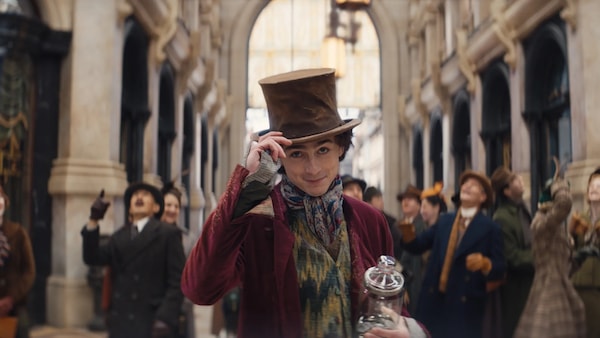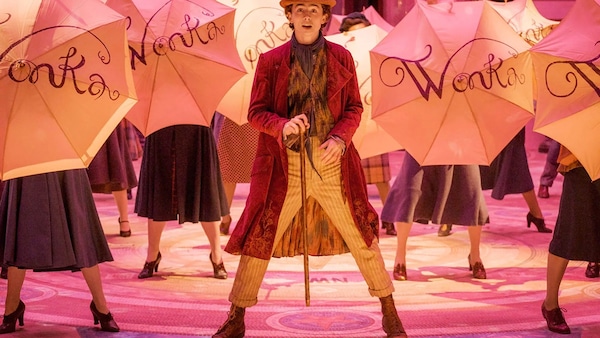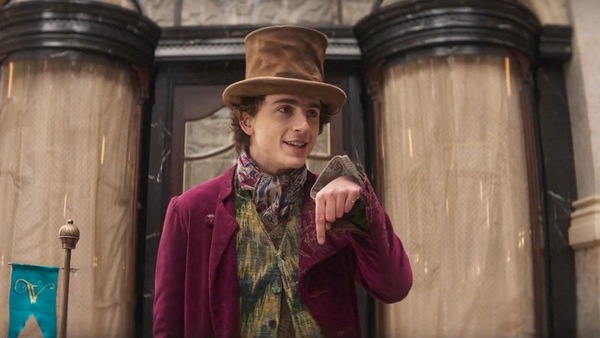Wonka: Pure Milk Chocolate In An Age Of Flavoured Dark Chocolate
This is #CineFile, where our critic Rahul Desai goes beyond the obvious takes, to dissect movies and shows that are in the news. Today: Wonka.

Last Updated: 06.28 PM, Dec 09, 2023
IT’s fascinating that “old-fashioned” is suddenly all the rage. I don’t mean the cocktail. (Maybe I do, in a way.) I mean the old-fashioned ways of doing things. Given the edgy and provocative times we live in, the simplicity of the good old days sounds inviting. Nostalgia is in. Finding childhood friends and books; vintage haircuts; reminiscing about newspapers and physical photo albums; taking to outdoor activities.And most of all, making art old-school again. Telling stories in forgotten, innocent ways again. That’s what director Paul King manages with Wonka. In 2023, it’s no small feat. It’s like pure milk chocolate in an age of flavoured dark chocolate.
The origin story of Willy Wonka — the famously eccentric chocolatier of Roald Dahl’s 1964 novel, Charlie and the Chocolate Factory — is sweet (literally), warm, colourful and funny. It’s a throwback to the fantasy musicals of yore: nothing too fancy, nothing too complex, just a lot of singing and design and creativity. Timothee Chalamet is charming as the magician-inventor-chocolatier who takes a new land by storm. He has this boyish zest — just about hopeful enough to be a teen and just about whimsical enough to be an adult who might go on to fashion morality tests in the future.

The film knows that we expect a slightly moody rendition of the character, given Wonka’s role in the Charlie and the Chocolate Factory movies. It would’ve been perfectly normal to stage him as a bit of a mad-hatting sociopath who — despite his personality — saves his friends, delights the people, and defeats his rivals. But the Wonka we see here is a compassionate genius coming to terms with his surroundings. It’s almost as if the makers deliberately present him as a normal musical hero, keeping in mind that an origin story cannot always be informed by the luxury of hindsight. He is yet to grow into the literary character we know and love. For now, he’s just another kid with a show to put on. With an Oompa-Loompa (an orange little Hugh Grant) of course. It’s a risk, but an honest one.
The premise is almost virginal. Wonka arrives with lofty dreams of opening the greatest chocolate shop in the world. He wants it to be an experience that transcends tasting and eating; the vision he has is unique. He remembers his late mother’s promise — that she would be by his side if he shares his gift with the people. But it’s not easy. Wonka is Ryan-Air-ed by a greedy innkeeper (Olivia Colman) the moment he arrives. (He doesn’t read the fine-print.) So he is charged a fortune for so much as breathing inside the place. Unable to pay up, he is forced to work as a laundryman in the basement — where he meets other ‘guests’ like him who were tricked into becoming staff members. One of them is an orphan named Noodles, who helps smuggle Wonka into the town every day to spread some chocolate love. Their bond is the beating heart of the film. Chalamet doesn’t have the best singing voice, but the lyrics (imagine the rhyming potential of ‘noodle’) lend a sense of levity to a film that is happy to stay in classical mode.

Together, the trapped staff members decide to enable the talented Wonka. He promises to earn enough money to free everyone. They believe in him. Naturally, conflicts arise in the form of a ‘Chocolate Cartel’ (a trifecta of jealous chocolatiers), the gluttonous and ever-expanding police chief on their payroll, a chocoholic priest (a delightful Rowan Atkinson cameo) and some choco-sabotage. At one point, when things go awry, Wonka is forced to strike a deal that evokes Tom Hanks’ conundrum in The Terminal — he must quit his craft and leave town forever in return for the clearance of his friends’ debts. It’s all very conventional, but strangely disarming in terms of how the film sticks to its crowd-pleasing, candy-gloss tone. There are cute heists, giraffes, a ‘death by chocolate’ crisis, and a winning spirit that resists the trappings of psychological whataboutery.
The irony is that — unlike the film itself — the novelty of Willy Wonka’s art is its ornamentation, audacity and experimental swag. His chocolates are anything but simple. (The special hover-chocs make people float away into the sky.) They have the most magical ingredients: a Russian dancer’s bittersweet tears, a yeti’s sweat, a Mumbai jungle’s bark, cherry and caramel and marshmallow. The Cartel chastises him in the beginning for diluting the purity of chocolate products, for being too fancy with the science of cocoa beans. But Wonka pays no heed. He trusts in his choco-ambition. He wants to reinvent the relationship between chocolate and taste buds. He is the newness in an old-fashioned field. He is the ‘wonky’ in the sobriety of sweet-making. His skills do all the gimmicks so that the storytelling doesn’t have to. This is, after all, the origin story of imagination itself.
